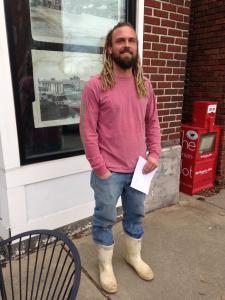Scott Wivell

Young Fishermen in the Northeast United States
Interviews with 39 fishers between the ages of 18-35, located along the US East Coast from Maine to North Carolina. Collectively, they represent a wide variety of gear types and fisheries. All had been fishing full-time for at least two years and wanted to make fishing their career. They describe motivations for choosing a fishing career, strategies used, barriers encountered, and facilitating factors that have enabled interviewees to defy the graying trend to become successful fishermen.
Please visit the Voices SoundCloud page to explore clips and stories that relate to this collection.
Sarah Schumann
Scott Wivell, age 29 at the time of his interview, is a waterman in Cape Charles, VA. Scott grew up fishing with his father and is now the owner-operator of the F/V Lady Lynnae, which he uses for gillnettting, crabbing and oystering. Scott markets some of his own catch and thinks about having a retail market someday.
Scope and Content Note
In his interview, Scott talks about the economics of fishing for a young person, and the need for better fisheries science and management built on trust and collaboration. He discusses how he got into oyster dredging, although he mentions that regulations have made it challenging for young fishermen to enter certain fisheries due to limited licenses and high costs. Scott discusses his interest in getting into retail to sell seafood directly to consumers, but he highlights the challenges posed by complex paperwork and regulatory barriers. He believes that engaging in retail would offer better job security and opportunities for fishermen.
What is needed for the next generation to thrive, Scott says, is “[i]deally, management that took fisheries suggestions for the weight of scientific suggestions… We need stock assessments. Because if the population drops in half, we know we got to catch less because they got to reproduce for next year. I understand all that. Because we need a future. But it needs to be a proper assessment. And I feel like a lot of stocks run into that improper assessment… All kinds of stuff up and down the coast, where there’s an assessment done, it just doesn’t line up with what we’re seeing day to day in fisheries. Like, you’ll see a stock that’s abundant and then they tell you it’s not. And so it’s hard to have faith in their word about the stuff you actually agree with them on, because they were wrong about the other stuff, so how are they right about this? There’s little faith there. If you had more of a communication between the scientists and the fishermen, I feel like you would have more sustainability. Because, at the end of the day, we just want to make a good day’s work... And we can’t do that, one, without proper fisheries management, but, two, without having a voice. Because if they don’t listen to us, we have nothing. And I feel like fishermen’s voices are basically muffled."
Please Note: The oral histories in this collection are protected by copyright and have been created for educational, research and personal use as described by the Fair Use Doctrine in the U.S. Copyright law. Please reach out Voices@noaa.gov to let us know how these interviews are being used in your research, project, exhibit, etc. The Voices staff can help provide other useful resources related to your inquiry.
The NOAA mission is to understand and predict changes in climate, weather, oceans, and coasts, to share that knowledge and information with others, and to conserve and manage coastal and marine ecosystems and resources. The Voices Oral History Archives offers public access to a wide range of accounts, including historical materials that are products of their particular times, and may contain offensive language or negative stereotypes.
Voices Oral History Archives does not verify the accuracy of materials submitted to us. The opinions expressed in the interviews are those of the interviewee only. The interviews here have been made available to the public only after the interviewer has confirmed that they have obtained consent.
